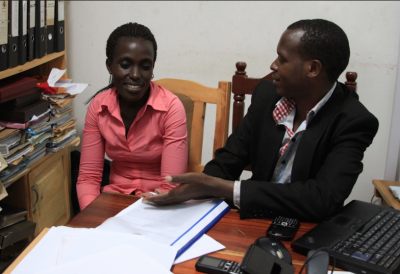
Continuing our series of articles from our Annual Report 2019/20, we outline here our work on our Legal Aid Forum Project.
At the start of 2019, Survivors Fund (SURF) and our partner AERG secured a grant of around RWF 40 million (£35,000) from the Legal and Civil Society Fund, a programme of the Rwanda Legal Aid Forum funded by the Royal Netherlands Embassy.
The project from March 2019 to February 2020 enables us to raise awareness and scale up our National Legal and Counselling Helpline with the aim that every survivor of the genocide against the Tutsi and related vulnerable young person is aware of their legal rights, and has access to legal advice to understand how legal issues that are negatively impacting on their lives can be resolved and where possible has access to, or is referred on to, legal representation if required.
This project builds on the tried and tested model of the Helpline, enhancing access to the provision of the service, particularly important over the 25th Anniversary of the Genocide. The project focuses on Kigali, and the Southern and Eastern Provinces to improve the situation of young people by ensuring that at least 2,000 of them are aware of their legal rights, 300 will have access to legal advice to understand how legal issues that are negatively impacting on their lives can be resolved and 30 will be represented to pursue their legal cases.
The work is focusing on five principal activities, which follow a logical approach of first identifying the nature and extent of the legal and mental health issues to be addressed through the project, raising awareness of the solution that we are presenting to address them, and then delivering the support, in the form of access to the Helpline, legal representation, and mental health care required, resulting in the enforcement of legal rights which is the overall objective of the project, and finally learning from the project to ultimately improve our future work.
Alphonsine *
One of the beneficiaries of the project is Alphonsine a young lady of 26 who was orphaned during the genocide. She survived with her elder brother and sister but together they deprived her of her right of inheritance to a share of their parents’ house in Kigali. After the genocide, she did not live with either sibling, and whilst still at school her brother tried to sell the house without any consultation with her.
Alphonsine called the Helpline asking for advice, and the Helpline Coordinator helped to facilitate mediation between the family members, which resulted in them all agreeing to sell the house and to share equally the RWF 15 million (£12,500) which was generated. This has enabled Alphonsine to buy her own house which she is now renting out to generate a monthly income of RWF 30,000 (£25).
Alphonsine is very happy to have her own house and she has a plan to renovate it and get more money from it. Her hope for the future has greatly improved as a result of now owning her own home, for which the Helpline has made possible. “The Helpline was very helpful to me and to many survivors who are using it. I called many times without charges. I am glad the phoneline is free. A lot of people, especially young survivors like me who are still at school, have no money to follow up their legal cases and to pay lawyers. Sometimes they don’t know about the Helpline or keep quiet and their property is taken from them. I will keep championing the Helpline and give the contact number to my friends.”
